
Persian Journal of Acarology
Scope & Guideline
Innovating the study of small creatures with big impacts.
Introduction
Aims and Scopes
- Taxonomy and Systematics of Mites:
A core focus of the journal is the identification and classification of various mite families and genera. Researchers publish taxonomic studies that often include descriptions of new species and revisions of existing classifications. - Ecological and Environmental Interactions:
The journal publishes research on the ecological roles of mites, including their interactions with plants, other arthropods, and environmental factors. This encompasses studies on population dynamics, host specificity, and the impact of abiotic factors. - Pest Management and Biological Control:
A significant area of research involves the exploration of biological control agents, particularly predatory mites, and their effectiveness in managing agricultural pests. Studies often assess the efficacy of natural enemies and integrated pest management strategies. - Impact of Climate and Abiotic Factors:
The journal includes studies that evaluate how climate change and other abiotic factors influence mite populations and behaviors, highlighting their adaptability and responses to environmental changes. - Health and Veterinary Acarology:
Another important aspect is the study of ticks and their role as vectors of diseases, contributing to veterinary science and public health. This includes research on tick-borne pathogens and their ecological implications.
Trending and Emerging
- Molecular Techniques in Acarology:
There is an increasing trend in the application of molecular techniques for the identification and study of mites and ticks. This includes the use of DNA barcoding and genetic analyses to resolve taxonomic ambiguities and understand population genetics. - Impact of Climate Change on Mite Biology:
Research focusing on the effects of climate change on mite populations and their interactions with ecosystems has gained momentum. This theme is critical as it addresses the implications of global warming on agricultural practices and pest management. - Integrative Pest Management Strategies:
There is a growing emphasis on integrative pest management (IPM) that combines biological control, ecological insights, and sustainable practices to manage mite populations effectively, reflecting an overall shift towards sustainability in agriculture. - Health Implications of Mites and Ticks:
Studies exploring the health implications of mites and ticks, particularly their role as vectors for zoonotic diseases, have become more prominent, highlighting the intersection of acarology with public health. - Innovative Biological Control Methods:
Emerging research on innovative biological control methods, including the use of entomopathogenic fungi and plant extracts, showcases a trend towards sustainable and eco-friendly pest management solutions.
Declining or Waning
- Studies on Stored Product Mites:
Research focusing on mites associated with stored products has decreased, possibly due to an increased focus on agricultural pests and biological control agents in crop production. - Traditional Acaricides and Chemical Control:
There is a noticeable decline in studies solely focused on chemical control methods, including traditional acaricides, as the field shifts towards more integrated and environmentally friendly pest management practices. - General Faunistic Surveys without Specific Focus:
While faunistic surveys are still published, there is a trend towards more targeted studies that address specific ecological questions or management strategies, leading to a reduction in broad surveys without deeper ecological insights.
Similar Journals
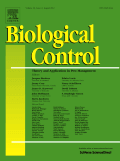
BIOLOGICAL CONTROL
Exploring the Future of Agronomy and Insect ScienceBIOLOGICAL CONTROL, published by Academic Press Inc Elsevier Science, is a prestigious journal focusing on the advancement of knowledge in the field of biological pest control and integrated pest management. With a high-impact factor reflecting its significant contributions to agronomy and insect science, it has secured elite positions in both Q1 categories as of 2023. The journal ranks within the top 6% and 12% of its fields on Scopus, making it an essential resource for researchers and professionals dedicated to sustainable agricultural practices and ecological balance. With its comprehensive exploration of theoretical and applied studies from 1991 to 2024, BIOLOGICAL CONTROL serves as a critical platform for disseminating innovative research and promoting dialogue among scholars, students, and practitioners. Although the journal follows a subscription-based access model, it consistently attracts contributions that shape the future of pest management strategies.
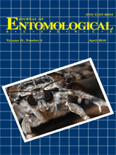
JOURNAL OF ENTOMOLOGICAL SCIENCE
Unraveling the Complexities of Insect LifeJOURNAL OF ENTOMOLOGICAL SCIENCE, published by the Georgia Entomological Society Inc, is a crucial resource in the field of insect science and ecology. With a rich history since its inception in 1993, the journal provides a platform for innovative research and comprehensive reviews addressing various aspects of entomology. Although not an open-access journal, it is highly regarded within its community, holding a Q3 ranking in Agronomy and Crop Science, Ecology, Evolution, Behavior and Systematics, and Insect Science as of 2023. Each issue promises to contribute valuable insights to professionals, researchers, and students alike, making it an essential publication for those looking to stay abreast of developments in entomological studies. The journal's editorial commitment ensures that it remains at the forefront of entomological research through rigorous peer reviews and a dedication to scholarly excellence.

JOURNAL OF INSECT SCIENCE
Bridging Disciplines through Insect StudiesJOURNAL OF INSECT SCIENCE, published by OXFORD UNIV PRESS INC, stands as a pivotal platform in the field of insect science, offering open-access research since 2001. With an impactful presence in the academic community, this journal spans the convergence of entomology and various interdisciplinary studies, establishing itself in the Q2 quartile for both Insect Science and Medicine (miscellaneous) categories as of 2023. This esteemed journal is recognized for its contributions to the understanding and management of insect biology, ecology, and their implications for agriculture and human health, garnering a Scopus rank of 44 out of 181 in Agricultural and Biological Sciences. The Open Access model encourages wide dissemination of knowledge, making the rich repository of research accessible to a global audience. With ongoing publications until 2024, JOURNAL OF INSECT SCIENCE serves as an essential resource for researchers, professionals, and students seeking to deepen their understanding of the crucial role insects play in our ecosystem.

PEST MANAGEMENT SCIENCE
Connecting Research and Practice in Pest ManagementPEST MANAGEMENT SCIENCE, published by John Wiley & Sons Ltd, stands as a leading journal in the realms of agronomy, crop science, and insect science. With an impressive Q1 ranking in these disciplines, as well as in miscellaneous medicine, this journal boasts a commendable influence within the academic community, reflected by its position within the top percentiles of Scopus rankings—ranked #7 out of 181 in Insect Science and #43 out of 406 in Agronomy and Crop Science. Covering a broad spectrum of pest management strategies and methodologies, it serves as an essential resource for researchers and professionals aiming to advance their knowledge and practices in sustainable agriculture and pest control. The journal’s commitment to open access ensures that cutting-edge research is widely disseminated, contributing significantly to global agricultural productivity and ecological sustainability. With coverage extending from 2000 to 2024, PEST MANAGEMENT SCIENCE remains pivotal in shaping the future of pest management.
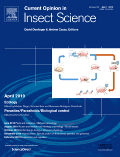
Current Opinion in Insect Science
Elevating Understanding in Insect Ecology and EvolutionCurrent Opinion in Insect Science is a leading academic journal published by ELSEVIER, dedicated to advancing understanding in the field of insect science. With an impressive impact factor reflected in its top quartile rankings (Q1) within both Ecology, Evolution, Behavior and Systematics and Insect Science, the journal holds a prominent position, ranking 3rd out of 181 journals in Insect Science and 35th out of 721 in Ecology-related fields according to Scopus for 2023. Since its inception in 2014, the journal has provided a dynamic platform for researchers, professionals, and students to explore and share cutting-edge developments and insights, targeting crucial topics in insect biology, ecology, and systematics. Although there are no open access options available, Current Opinion in Insect Science remains an essential resource for those looking to stay at the forefront of their research or academic interests.

PAKISTAN JOURNAL OF ZOOLOGY
Fostering collaboration for a thriving zoological community.Pakistan Journal of Zoology, established in 1975 and published by the Zoological Society of Pakistan, is a pivotal resource in the field of zoology and animal science, contributing to the academic discourse and research advancements in the region. With an ISSN of 0030-9923, this journal strives to disseminate innovative research findings and scholarly articles that explore various facets of animal biology, ecology, and conservation. Although classified in the Q4 quartile within the animal science category, its commitment to providing a platform for emerging researchers makes it crucial for those in the zoological community. The journal covers a broad range of topics relevant to contemporary issues in zoology, promoting both local and international collaborations. Situated in Lahore, Pakistan, its contributions are vital for promoting biodiversity awareness and conservation efforts within the region. Accessible research outputs empower students and professionals alike to engage in critical discussions and applications within the disciplines of zoology and animal science.
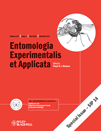
ENTOMOLOGIA EXPERIMENTALIS ET APPLICATA
Innovating methodologies for impactful findings in entomology.ENTOMOLOGIA EXPERIMENTALIS ET APPLICATA is a premier journal dedicated to advancing the understanding of insect science through innovative research and thorough experimental methodologies. Published by Wiley, this esteemed journal has been at the forefront of entomology since its inception in 1958, with its latest convergence extending until 2024. With a commendable Impact Factor and categorically positioned in the Q2 quartile across both Ecology, Evolution, Behavior and Systematics and Insect Science fields, it plays a pivotal role in the dissemination of critical findings. The journal is indexed in Scopus, ranking 43rd out of 181 in Insect Science, showcasing its relevance and stature within the academic community, while maintaining a robust visibility among scholars. Given its rigorous peer-review process and a commitment to quality and innovation, ENTOMOLOGIA EXPERIMENTALIS ET APPLICATA serves as a vital resource for researchers, professionals, and students aiming to deepen their insights into entomological research.
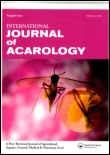
INTERNATIONAL JOURNAL OF ACAROLOGY
Driving Discourse in Agricultural and Biological SciencesThe INTERNATIONAL JOURNAL OF ACAROLOGY is a leading scholarly journal published by TAYLOR & FRANCIS INC, focusing on the multidisciplinary study of acari (mites and ticks) as well as their ecological and economic impact. With an ISSN of 0164-7954 and an E-ISSN of 1945-3892, this journal has been a pivotal resource since its inception in 1975, now converging into 2024 with an emphasis on high-quality research in the field. The journal currently holds a commendable Q2 ranking in Insect Science within the Scopus database, placing it at the 58th percentile among its peers. This emphasizes the journal’s credibility and relevance in advancing scientific understanding, making it an essential platform for researchers, professionals, and students alike dedicated to acariology and related disciplines. Although it does not provide open access, the journal's scope continues to drive significant discourse and innovation, promoting collaboration and the dissemination of critical findings in agricultural and biological sciences.
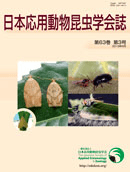
JAPANESE JOURNAL OF APPLIED ENTOMOLOGY AND ZOOLOGY
Unveiling the Secrets of Insect Behavior and EcologyJapanese Journal of Applied Entomology and Zoology is a premier publication in the field of Insect Science, offering a platform for researchers and practitioners to share their findings on applied entomology and zoology. Established in 1957 and published by the Japan Society of Applied Entomology and Zoology, this journal aims to foster the understanding of insect-related studies that impact agriculture, ecology, and biodiversity. With an ISSN of 0021-4914 and E-ISSN of 1347-6068, it serves as a crucial resource for both academics and industry professionals. While the journal currently resides in the Q4 category of the Scopus ranking for Insect Science with a percentile of 11th, it plays a significant role in providing valuable insights into insect behavior, systematics, and their ecological roles. Readers can benefit from its published research to drive innovations and solutions in pest management and conservation practices. As the journal continues to evolve, it reinforces its commitment to disseminating critical research that supports sustainable practices in entomology and zoology through its convergence extending to the year 2024.

JOURNAL OF PEST SCIENCE
Exploring the forefront of pest science and sustainable agriculture.JOURNAL OF PEST SCIENCE, published by SPRINGER HEIDELBERG, is a premier academic journal dedicated to the multidisciplinary study of pest management, contributing significantly to the fields of Agronomy, Ecology, and Insect Science. With a history that spans back to 1925, this journal has established itself as a critical platform for disseminating innovative research, evidenced by its impressive Q1 rankings in multiple categories, including Ecology and Plant Science, as of 2023. The journal particularly excels in its contribution to Agricultural and Biological Sciences, holding a remarkable 98th percentile rank in Insect Science. By fostering open access, the JOURNAL OF PEST SCIENCE ensures broader dissemination and engagement with scientific advancements pertinent to pest control and management practices. Its commitment to publishing high-quality, peer-reviewed articles makes it an essential resource for researchers, professionals, and students looking to stay at the forefront of pest science and its application to sustainable agriculture and ecology.